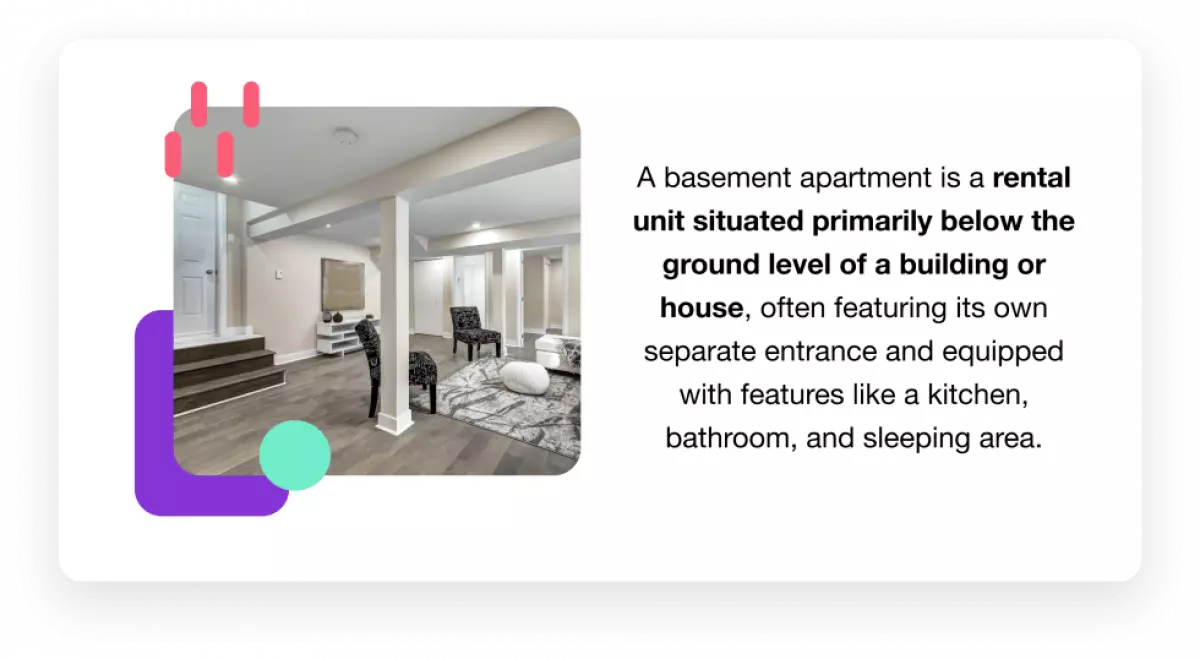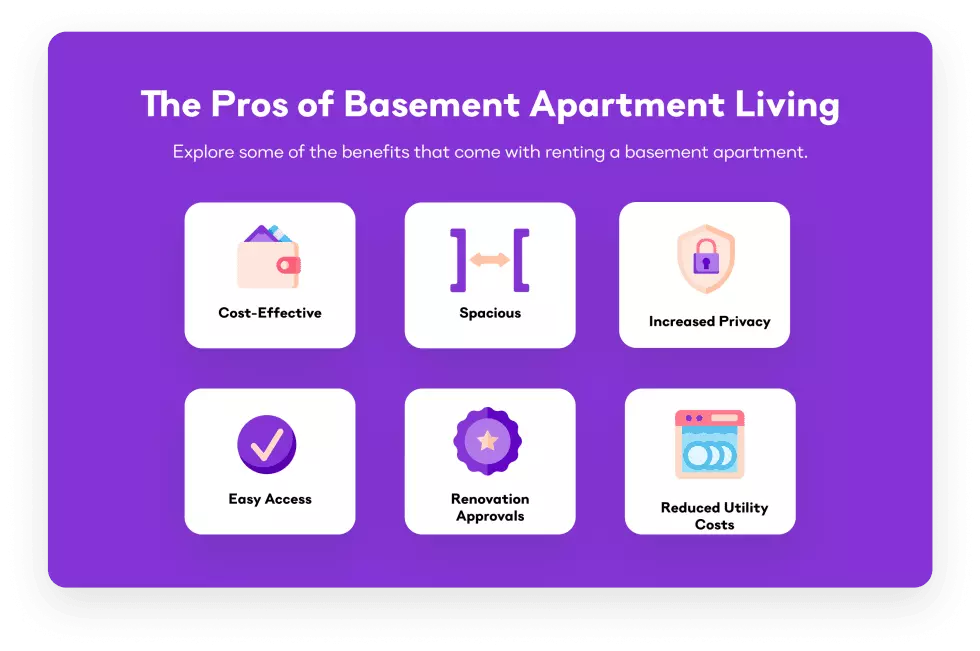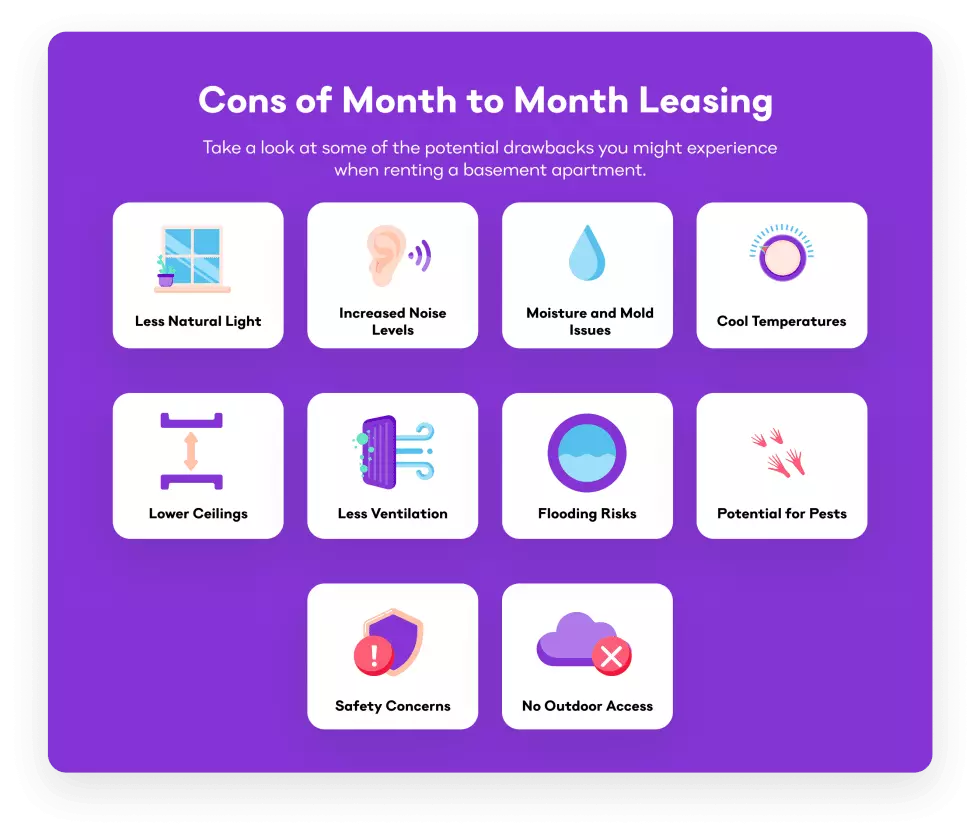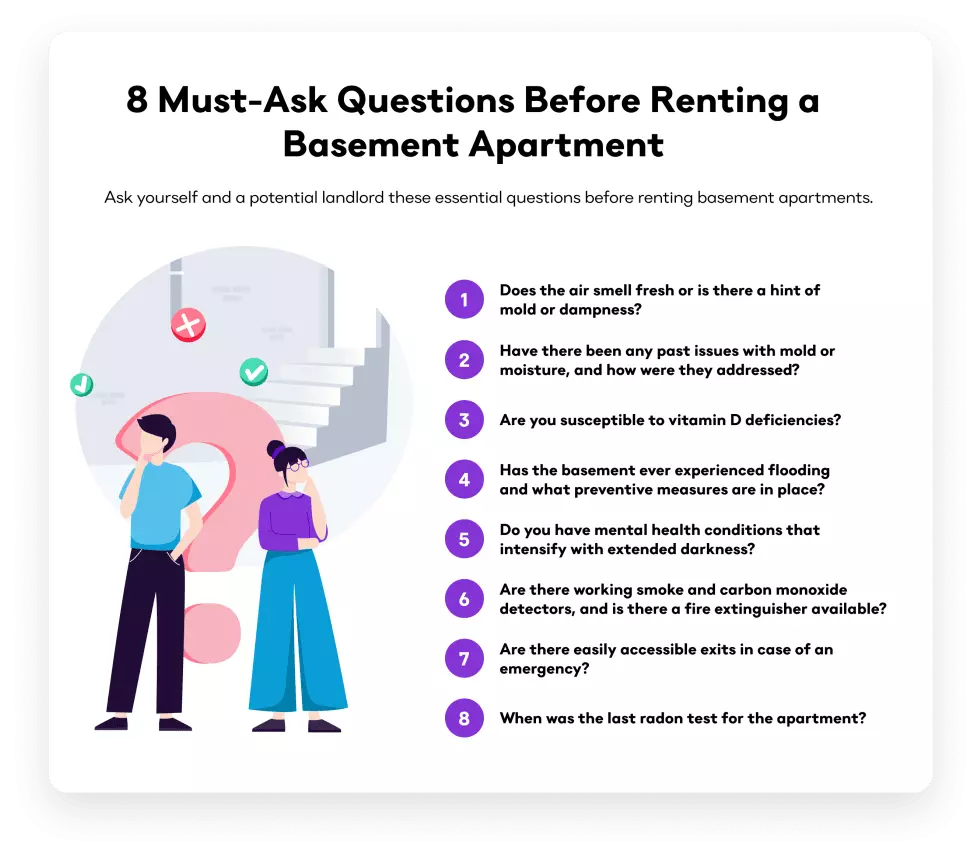If you find yourself struggling with exorbitant rental prices or facing a scarcity of available units, especially in urban areas, it may be time to consider a basement apartment. In this comprehensive guide, we will walk you through everything you need to know about these unique living spaces. From the different types of basement apartments available to the pros and cons of basement rentals, and the questions you should ask before renting, we've got you covered.
A Guide to Basement Rentals
Let's start by understanding what exactly a basement apartment is. A basement apartment is a living space primarily located below ground level, typically found in apartment complexes or multi-family properties. While at least 50% of the unit is beneath the surface, basement apartments often feature larger windows that allow some natural light to filter in. Though the light may be less abundant compared to above-ground units, it still brightens the space, especially during sunnier seasons.
 Basement Apartment Living
Basement Apartment Living
Different Types of Basement Apartments
Basement apartments come in various types. Let's explore the different options available:
-
Daylight basement apartment: These unique basement apartments have at least one sliding door or full-sized window, providing better opportunities for fresh air circulation and natural sunlight during the day. Some landlords may refer to these as "English basements."
-
Below-ground apartment units: As the name suggests, these basement apartments do not have any full-sized windows or sliding doors. While they are typically less expensive than daylight basement apartments, they may be darker and less airy.
-
House basements: House basements are originally not designed for living spaces, but they can be converted into bedrooms, bathrooms, or family rooms. These renovated basements can then be rented out to tenants.
Now that you understand the different types of basement apartments available, let's delve deeper into whether living in a basement apartment is everything it's cracked up to be.
Basement Rentals: Advantages
Before we explore the drawbacks, let's discuss the advantages of living in a basement apartment:
Cost-Effective
One of the biggest advantages of basement apartments is their affordability. These units come at a more reasonable price compared to their above-ground counterparts. While you may sacrifice abundant natural light and breathtaking views, the upside is a more budget-friendly option. It's all about getting more value for your money.
Spacious
Basement units often offer more living space compared to other apartments within the same property. This is because essential home systems, such as HVAC, plumbing, and laundry utilities, are located in the basement, freeing up additional space in the unit. This unique layout provides not only functional systems but also a bonus in living area for basement dwellers.
Increased Privacy
Many basement apartments come with the perk of a private entrance, adding an exclusive touch to your living space. Moreover, if the basement apartment is part of a single-family property, you'll likely be the sole tenant enjoying the seclusion of the basement level. This separation adds an extra layer of privacy and quiet, making it feel like your own personal retreat.
 The Pros of Basement Apartment Living
The Pros of Basement Apartment Living
Easy Access
Living in a basement apartment offers street-level convenience. If you're familiar with bustling cities, you'll appreciate the ease of street access that basement living provides. Imagine not having to carry groceries up several flights of stairs or being able to quickly step outside with your pet for a bathroom break. That's the simplicity a basement apartment offers.
Renovation Approvals
Depending on your landlord's policies and local building regulations, basement apartments might provide you with more flexibility when it comes to personalizing your space and making minor renovations. Of course, any renovations will depend on your landlord and the terms of your lease, so it's essential to have a conversation with them beforehand.
Reduced Utility Costs
Living in a basement apartment has the added advantage of natural insulation due to its below-ground location. This often results in basement apartments being more energy-efficient, leading to reduced cooling and heating bills. In the long run, you could benefit from significant cost savings.
Basement Rentals: Disadvantages
Like any living situation, basement apartments also have their drawbacks. Here are some potential disadvantages to consider:
Less Natural Light
Compared to other apartments, basements often receive less natural light. This can be particularly challenging during the winter months. However, there are ways to counteract this issue by investing in lights with adjustable brightness settings and using mirrors to reflect light and create a brighter atmosphere.
Increased Noise Levels
Basement apartments may have less noise insulation between the first floor and the basement. As a result, the sounds from your upstairs neighbors can seem louder than they actually are. Additionally, you may also have to contend with the noise from sump pumps during rainy weather and the hum of HVAC systems.
 Cons of Basement Apartment Living
Cons of Basement Apartment Living
Moisture and Mold Issues
Basement apartments tend to have higher levels of moisture, which can lead to mold growth, even if the apartment has been professionally treated. Unfortunately, this can result in a mildew-like smell that lingers throughout the unit.
Cool Temperatures
During the summer, basement apartments are naturally cool, providing relief from hot weather. However, in the winter, you may experience colder temperatures unless you have a personal heater or adequate insulation.
Lower Ceilings
One common drawback of basement apartments is the typically lower ceiling height, which can make the space feel more confined. If you're taller than average, you may find it uncomfortable to navigate through the apartment due to the limited vertical space.
Less Ventilation
Proper ventilation can be a challenge for basement apartments, especially those that are entirely below ground. This can make it difficult to control indoor humidity levels and eliminate stale air. Inadequate ventilation can also lead to issues with mold and mildew, which can be harmful to your health and require professional maintenance.
Flooding Risks
Depending on the region where your basement apartment is located, there may be a risk of flooding during flood season or heavy rains. This can result in damage to your belongings. It's essential to inquire about preventive measures, such as sump pumps and drainage systems, before renting a basement apartment.
Potential for Pests
Being at or below ground level, basement apartments are more susceptible to pests such as spiders, centipedes, and other common household bugs. If you have an aversion to these creatures, basement living may not be the best option for you.
Safety Concerns
Unfortunately, basement apartments may be more vulnerable to security threats. They are often located closer to the building's exterior, and some may have windows at ground level, potentially making them easier targets for burglaries. Ensure that you have the right security measures in place to feel safe and secure in your basement apartment.
No Outdoor Access
Basement apartments typically do not offer outdoor access, such as a patio or backyard. If outdoor recreation is essential to you, you'll have to seek alternative options, such as local parks or hiking trails.
The Legality of Basement Apartments
When considering basement units for rent, it's crucial to be aware of local laws and regulations. This is especially important in places like New York City, where specific codes must be met. Basement apartments, being partially or entirely below ground, face unique challenges such as flooding, mold, poor ventilation, and limited escape routes. In NYC, for example, a legal basement apartment must have a ceiling height of at least 7 feet and at least one window in every room. It's also important to ensure there are at least two forms of egress, such as a standard entry door and an egress window or another door large enough for emergency exits.
The primary concern is safety. Always check for a Certificate of Occupancy to ensure that the basement apartment meets all building and zoning laws for residential use. In NYC, you can use the DOB website as a resource. It's advisable to be cautious with older units, as some may not be up to code and could be vulnerable to issues like flooding or sewage problems. Familiarizing yourself with local regulations can significantly contribute to finding a safe and legal basement apartment.
8 Questions to Ask Before Renting a Basement Apartment
Before jumping into renting a basement apartment, it's essential to ask yourself and the landlord a few key questions. Consider the following:
- Does the air smell fresh, or is there a hint of mold or dampness?
- Are you susceptible to vitamin D deficiencies due to limited natural light?
- Do you have any mental health conditions that may worsen with extended darkness?
- Are there easily accessible exits in case of emergencies?
- Have there been any past issues with mold or moisture, and how were they addressed?
- Has the basement ever experienced flooding, and what preventive measures are in place?
- Are there functioning smoke and carbon monoxide detectors, as well as a fire extinguisher available?
- When was the last radon test conducted for the apartment?
Asking these questions will help ensure that the basement apartment you have your eye on is suitable for year-round living.
 8 Must-Ask Questions Before Renting a Basement Apartment
8 Must-Ask Questions Before Renting a Basement Apartment
Is Your Basement Apartment Code-Ready?
Similar to asking questions before moving into a basement apartment, it's important to make sure that the apartment meets all building codes and safety standards. Here are a few things to consider:
-
Inspect Egress Requirements: Verify that you have proper exits and escape routes, as per local building codes, in case of emergencies.
-
Check Ceiling Heights: Ensure that the height of the basement ceiling meets the minimum requirements set by the local building codes.
-
Assess Ventilation: Don't compromise on air quality and moisture control. Confirm that the apartment has proper ventilation.
-
Assess the Plumbing and Electrical: Check if the plumbing and electrical systems comply with local building codes and don't pose any safety hazards.
-
Verify Smoke and CO Detectors: Ensure that all smoke and carbon monoxide detectors are in place and functioning properly.
Once you've confirmed that your basement apartment meets code requirements, you can feel more confident in your decision to make it your home.
Is a Basement Apartment Right for You?
Now that you have a comprehensive understanding of basement apartments and what to consider before renting one, it's time to determine if it's the right living option for you. Assess your specific needs and preferences, such as proximity to work, access to amenities, or in-unit laundry. Apartment List can assist you in finding an apartment that meets all your criteria. When you're ready to explore the best basement apartments for rent, take our personalized quiz to save time and energy during your search.
Basement Apartment FAQs
Are Basement Apartments Different from Garden Apartments?
Yes, basement apartments and garden apartments differ in several ways:
- Location: Basement apartments are situated below ground level, while garden apartments are typically on the ground floor or slightly below ground level.
- Access to natural light: Basement apartments usually have fewer windows than garden apartments, resulting in less natural light.
- Privacy: Garden apartments often come with private patios or balconies, offering more privacy compared to basement apartments.
- Security: Basement apartments may be more susceptible to flooding and security risks than garden apartments.
- Price: Basement apartments tend to be more affordable than garden apartments.
Are Basement Apartments the Same as Cellar Apartments?
No, basement apartments and cellar apartments are not the same. A cellar apartment is an enclosed space where more than half of its height is below curb level, while a basement apartment is a story of a building partly below curb level but with at least half of its height above the curb level.
What Is the Average Size of a Basement Apartment?
The average size of a basement apartment ranges from 600 to 1,000 square feet. However, the exact size can vary based on the house's dimensions and the basement's layout. Some basement apartments may be smaller, while others can be larger.
How Do I Make the Best of a Basement Apartment?
To make the most of a basement apartment, consider the following tips:
- Maximize natural light sources
- Use light colors to create a brighter ambiance
- Add mirrors to reflect light and create an illusion of space
- Incorporate plants to bring life and freshness to the environment
- Use rugs and textiles to add warmth and comfort
- Keep the space clutter-free to maintain a sense of openness
- Infuse your personal touch to make the space feel like home.
What Types of Safety Features Should a Basement Apartment Have?
Important safety features for a basement apartment include:
- Functional smoke and carbon monoxide detectors
- Properly installed plumbing and electrical systems
- Working fire extinguishers
- Compliance with local building codes.
How Can I Reduce Humidity in a Basement Apartment?
To reduce humidity levels in a basement apartment, consider investing in a dehumidifier to remove excess moisture. Another option is to keep windows open, accompanied by the use of exhaust fans to improve ventilation.
How Can I Keep My Basement Apartment Cool in the Summer?
Here are some tips to keep your basement apartment cool during the summer:
- Install a dehumidifier to control moisture levels
- Keep the windows closed during the hottest part of the day
- Use fans to circulate air and create a cooling effect
- Paint your basement walls in light colors to reflect heat
- Keep the space clean and organized for optimal airflow.
How Can I Keep My Basement Apartment Warm in the Winter?
To ensure a warm and cozy basement apartment during the winter, try the following:
- Insulate the space to prevent heat loss
- Seal any cracks or gaps to minimize drafts
- Add weatherstripping to windows and doors
- Install storm windows or doors for extra insulation
- Use a space heater to supplement central heating
- Keep the basement door closed to retain heat
- Use warm rugs and blankets for added insulation
- Regularly ventilate the space to maintain air quality.
With this ultimate guide to basement apartment living, you have all the information you need to make an informed decision about renting and living in a basement apartment. Don't forget to assess your personal preferences and use Apartment List's resources to find the perfect basement apartment for your needs.











